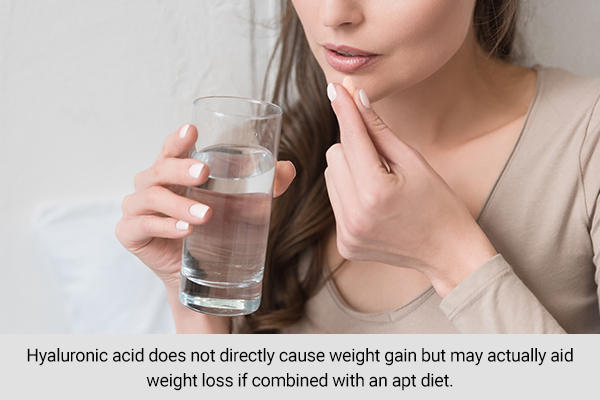In this article:
No, hyaluronic acid does not cause chronic water retention. Hyaluronic acid is naturally produced by the body and is used in cosmetic treatments and medical procedures for its ability to hydrate and plump the skin, as well as lubricate joints. (1)

However, it has never been reported to cause weight gain. In fact, it can act as an anti-obesity agent when combined with the appropriate diet. (2)
Read on to clear a common misconception about hyaluronic acid – that its water-retentive properties can lead to weight gain.
Hyaluronic Acid’s Impact on Weight
No, hyaluronic acid does not directly cause weight gain but may actually aid weight loss if combined with an apt diet. (2) Hyaluronic acid is a type of polysaccharide that is found naturally in the body and has no caloric value. (1)(3)

Injections of hyaluronic acid are commonly used to treat joint pain, and topical formulations of hyaluronic acid are used in skin care products to improve skin hydration and elasticity. (4)
However, it is important to note that some people may experience temporary water retention after receiving hyaluronic acid injections, such as joint injections for osteoarthritis or eye injections. (5)(6)(7) This is due to the injection of a large amount of fluid into the body.
If you have concerns about water retention or any other side effects of hyaluronic acid, it is best to speak with a healthcare provider. It is also important to note that weight gain can be caused by many factors, including diet, lifestyle, and lack of exercise. (8)
If you are experiencing weight gain and are unsure of the cause, it is best to speak with a healthcare provider. They can help you determine the root cause of your weight gain and suggest an appropriate course of action.
Hyaluronic Acid and Water Retention
Hyaluronic acid is a highly hydrophilic (water-loving) molecule that has the ability to retain water due to its unique molecular structure. This structure gives hyaluronic acid a large surface area, allowing it to bind and retain water molecules effectively. (3)(9)
In the skin, hyaluronic acid works by attracting water molecules from the air and dermis (the middle layer of skin) and holding them in place. This helps to keep the skin hydrated and plump, reducing the appearance of fine lines and wrinkles. (3)
As age increases, the body produces less and less hyaluronic acid, which can lead to dryness and wrinkles in the skin. That is why hyaluronic acid has become a popular ingredient in skin care products, as it is believed to help restore and maintain the skin’s youthful appearance.
The molecule’s hydrophilic properties also make it an excellent lubricant, which is why it is commonly used in joint injections to treat osteoarthritis. (3)(4)
Overall, hyaluronic acid’s ability to retain water is what makes it a valuable ingredient in skin care products, as well as a crucial component of the body’s natural hydration and lubrication systems.
Most-Asked Questions About Hyaluronic Acid and Weight Gain
My doctor just told me that I have developed edema. Is this due to the hyaluronic acid in my cosmetics?
Chronic water retention, also known as edema, is a condition where excess fluid builds up in the body’s tissues. This can be caused by a variety of factors, including heart or kidney disease, liver disease, certain medications, and hormonal imbalances.
Hyaluronic acid is not known to cause chronic water retention.
I am getting hyaluronic acid injections for medical purposes. How much weight will I gain?
Hyaluronic acid causes only temporary edema (fluid retention) and, hence, temporary weight gain. The amount of weight you may gain temporarily depends on various factors such as the type and duration of your treatment.
Final Word
Hyaluronic acid is a naturally occurring substance in the body and is used in cosmetic treatments and medical procedures for its hydrating and lubricating properties. Hyaluronic acid does not lead to weight gain directly, as it has no caloric value.
Hyaluronic acid is a useful substance for its hydrating and lubricating properties, but it is not a factor in weight gain. Weight gain can be caused by a variety of factors, including diet, physical activity, genetics, medical conditions, and hormonal changes.
If you are concerned about weight gain, it is best to speak with a healthcare provider to determine the root cause and develop an appropriate plan for weight loss.
- Was this article helpful?
- YES, THANKS!NOT REALLY


